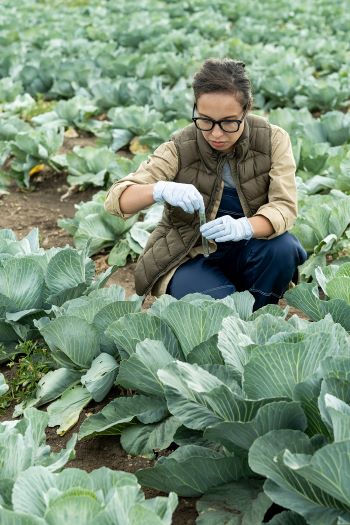The application period for this program is closed.
The Specialty Crop Block Grant (SCBG) program funds projects that will increase the competitiveness of Minnesota-grown specialty crops in domestic and foreign markets.
The United States Department of Agriculture (USDA) defines specialty crops as fruits and vegetables, tree nuts, dried fruits, horticulture and nursery crops, floriculture, and processed products that have 50% or more specialty crop content by weight, exclusive of added water. See USDA's detailed list of eligible specialty crops (PDF) for more information.
Applicant eligibility
We encourage the following groups to apply for the SCBG:
- Nonprofit organizations
- Producer organizations
- Government agencies
- Universities
- Tribal organizations
- Other agricultural groups
Projects proposed by individual producers, for-profit businesses, or commercial entities are eligible only if they demonstrate a significant benefit to the broader specialty crop industry.
Project eligibility
Projects must enhance the competitiveness of specialty crops that are grown in Minnesota by:
- Leveraging efforts to market and promote specialty crops;
- Assisting producers with research and development relevant to specialty crops;
- Expanding availability and access to specialty crops; or
- Addressing local and regional challenges confronting specialty crop producers.
A specialty crop is defined by USDA. This program cannot fund starting a business or expanding a farm. Each project must demonstrate external support from specialty crop stakeholders and produce measurable outcomes for the specialty crop industry or public beneficiaries. Projects that address problems or opportunities that cross state boundaries are eligible.
Visit the USDA SCBG Program Awarded Grants page to see previously funded projects in Minnesota and across the country.
Funding priorities
In 2026, the funding priorities for the Minnesota SCBG program are:
- Marketing and promotion to increase sales of specialty crops
- Aggregation and distribution to increase access to/sales of specialty crops
- Control and prevention of biological threats (pests/diseases) to specialty crops
- Projects that benefit beginning farmers and first-time specialty crop producers
Funding availability
We anticipate awarding approximately $1.25 million using a competitive review process. Project funding is contingent on USDA making funds available to us.
The maximum award is $125,000 and the minimum award is $25,000. We expect 12 to 15 grants will be awarded, but the final number depends on the size of awards.
There is no matching requirement.
How to apply
The application period for the 2026 Specialty Crop Block Grant closed on February 11, 2026. We anticipate accepting applications for the 2027 round of funding in December 2026 or January of 2027.
Details on this page and in the 2026 SCBG Request for Proposals (PDF) apply to the past round of funding, but they may be helpful for you to review if you want to learn more about the program.
We encourage you to read the Question and Answer (Q&A) page and view previous project descriptions on the Past Projects page to help you with your application.
Contact us if you need this information in an alternative format.
Timeline and deadlines
| Date | Step |
|---|---|
| December 2025 | Application period begins. |
| February 4, 2026, 4 p.m. CT | Deadline to ask questions. |
| February 11, 2026, 4 p.m. CT | Applications due. |
| March to April 2026 | MDA review. |
| April 2026 | Applicants notified of provisional approval and denial. |
| Summer 2026 | USDA review. |
| Fall 2026 | Applicants notified of decisions; grant contracting begins. |
| November 1, 2026 | Anticipated project start date. |
| April 30, 2029 | Planned project end date. |
| September 29, 2029 | Latest project end date. |
Program background
Funding for the SCBG program is made possible by a cooperative agreement between USDA Agricultural Marketing Service (AMS) and the MDA. SCBG is authorized under section 101 of the Specialty Crops Competitiveness Act of 2004 (7 U.S.C. Section 1621 note) and amended under section 10107 of the Agriculture Improvement Act of 2018, Public Law 115‐343 (the Farm Bill). The contents of this webpage and other program materials are solely the responsibility of the authors and do not necessarily represent the official views of the USDA.


